Entrepreneurial Ventures, Economy Impact, and Mindset Report
VerifiedAdded on 2020/10/04
|16
|5173
|389
Report
AI Summary
This report delves into the realm of entrepreneurship and small business management, exploring various types of entrepreneurial ventures including small business, scalable start-up, large company, and social entrepreneurship, highlighting their similarities and differences. It examines the impact of micro and small businesses on the UK economy, supported by data and statistics, emphasizing their contribution to employment and the social economy. The report further investigates the key aspects of an entrepreneurial mindset, including the characteristic traits and skills of successful entrepreneurs, and the influence of personal background and experience on fostering or hindering entrepreneurship. It provides an understanding of entrepreneurial ventures in both the public and corporate sectors.

ENTREPRENEURSHIP
AND SMALL BUSINESS
MANAGEMENT
AND SMALL BUSINESS
MANAGEMENT
Paraphrase This Document
Need a fresh take? Get an instant paraphrase of this document with our AI Paraphraser
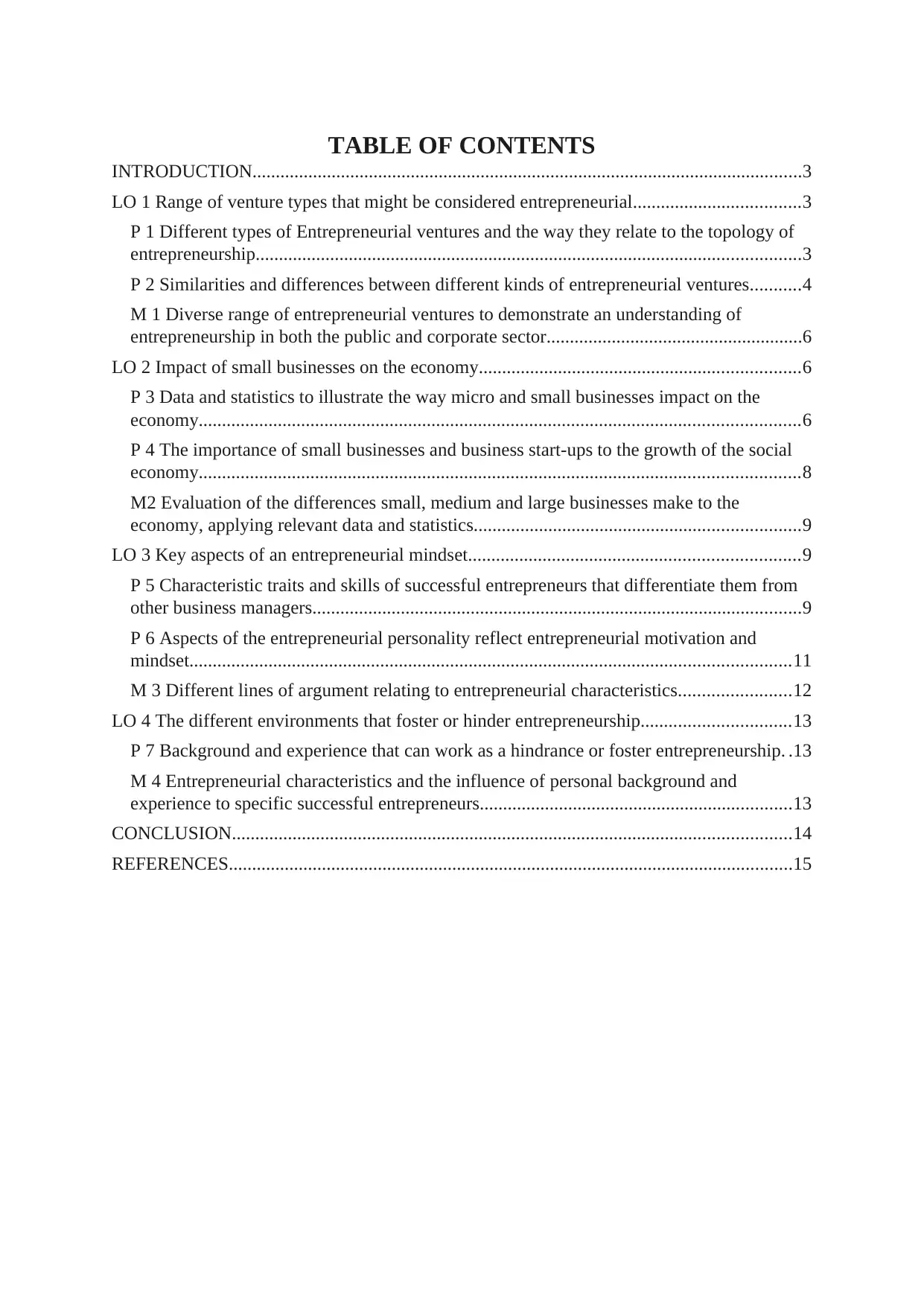
TABLE OF CONTENTS
INTRODUCTION......................................................................................................................3
LO 1 Range of venture types that might be considered entrepreneurial....................................3
P 1 Different types of Entrepreneurial ventures and the way they relate to the topology of
entrepreneurship.....................................................................................................................3
P 2 Similarities and differences between different kinds of entrepreneurial ventures...........4
M 1 Diverse range of entrepreneurial ventures to demonstrate an understanding of
entrepreneurship in both the public and corporate sector.......................................................6
LO 2 Impact of small businesses on the economy.....................................................................6
P 3 Data and statistics to illustrate the way micro and small businesses impact on the
economy.................................................................................................................................6
P 4 The importance of small businesses and business start-ups to the growth of the social
economy.................................................................................................................................8
M2 Evaluation of the differences small, medium and large businesses make to the
economy, applying relevant data and statistics......................................................................9
LO 3 Key aspects of an entrepreneurial mindset.......................................................................9
P 5 Characteristic traits and skills of successful entrepreneurs that differentiate them from
other business managers.........................................................................................................9
P 6 Aspects of the entrepreneurial personality reflect entrepreneurial motivation and
mindset.................................................................................................................................11
M 3 Different lines of argument relating to entrepreneurial characteristics........................12
LO 4 The different environments that foster or hinder entrepreneurship................................13
P 7 Background and experience that can work as a hindrance or foster entrepreneurship. .13
M 4 Entrepreneurial characteristics and the influence of personal background and
experience to specific successful entrepreneurs...................................................................13
CONCLUSION........................................................................................................................14
REFERENCES.........................................................................................................................15
INTRODUCTION......................................................................................................................3
LO 1 Range of venture types that might be considered entrepreneurial....................................3
P 1 Different types of Entrepreneurial ventures and the way they relate to the topology of
entrepreneurship.....................................................................................................................3
P 2 Similarities and differences between different kinds of entrepreneurial ventures...........4
M 1 Diverse range of entrepreneurial ventures to demonstrate an understanding of
entrepreneurship in both the public and corporate sector.......................................................6
LO 2 Impact of small businesses on the economy.....................................................................6
P 3 Data and statistics to illustrate the way micro and small businesses impact on the
economy.................................................................................................................................6
P 4 The importance of small businesses and business start-ups to the growth of the social
economy.................................................................................................................................8
M2 Evaluation of the differences small, medium and large businesses make to the
economy, applying relevant data and statistics......................................................................9
LO 3 Key aspects of an entrepreneurial mindset.......................................................................9
P 5 Characteristic traits and skills of successful entrepreneurs that differentiate them from
other business managers.........................................................................................................9
P 6 Aspects of the entrepreneurial personality reflect entrepreneurial motivation and
mindset.................................................................................................................................11
M 3 Different lines of argument relating to entrepreneurial characteristics........................12
LO 4 The different environments that foster or hinder entrepreneurship................................13
P 7 Background and experience that can work as a hindrance or foster entrepreneurship. .13
M 4 Entrepreneurial characteristics and the influence of personal background and
experience to specific successful entrepreneurs...................................................................13
CONCLUSION........................................................................................................................14
REFERENCES.........................................................................................................................15
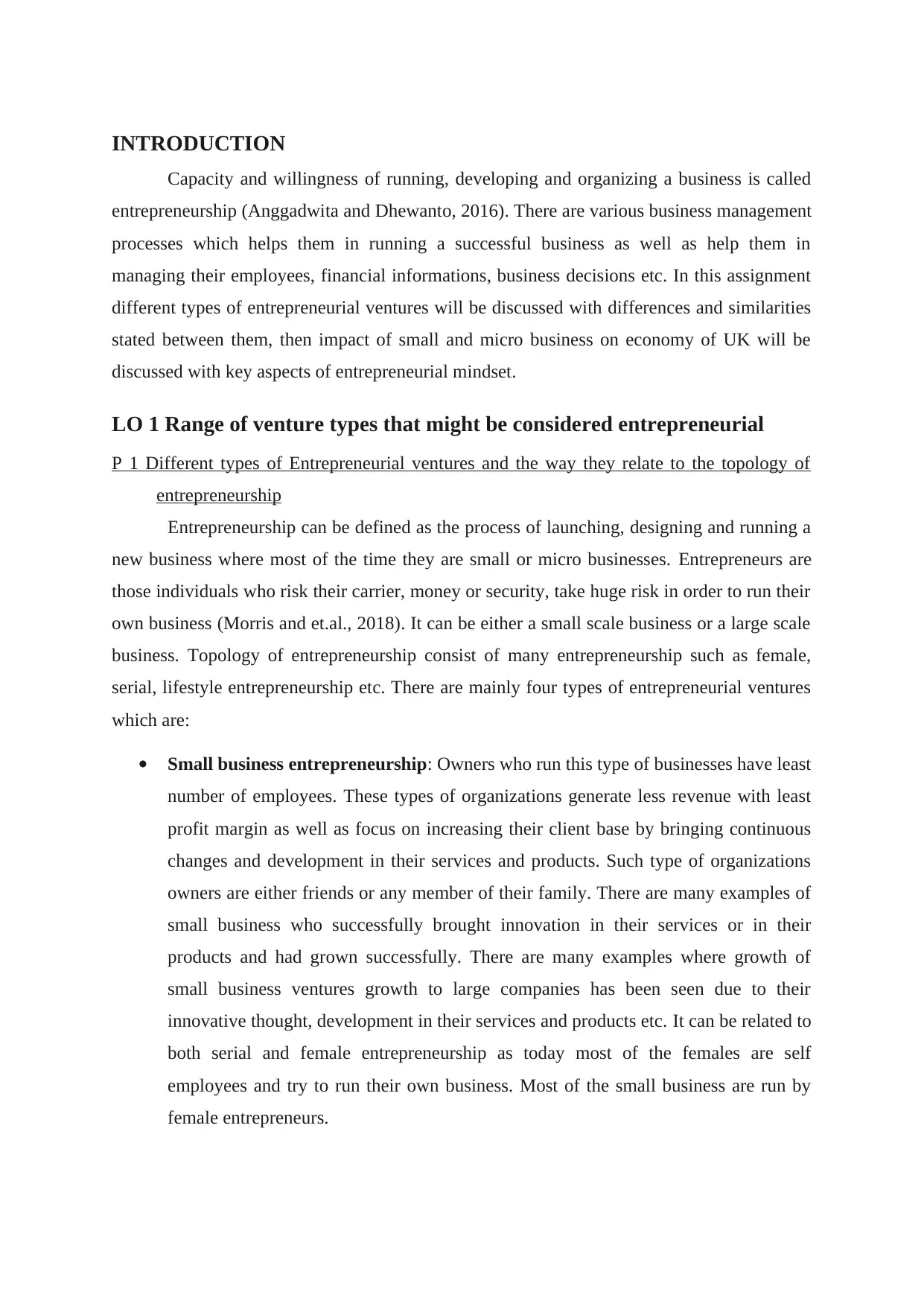
INTRODUCTION
Capacity and willingness of running, developing and organizing a business is called
entrepreneurship (Anggadwita and Dhewanto, 2016). There are various business management
processes which helps them in running a successful business as well as help them in
managing their employees, financial informations, business decisions etc. In this assignment
different types of entrepreneurial ventures will be discussed with differences and similarities
stated between them, then impact of small and micro business on economy of UK will be
discussed with key aspects of entrepreneurial mindset.
LO 1 Range of venture types that might be considered entrepreneurial
P 1 Different types of Entrepreneurial ventures and the way they relate to the topology of
entrepreneurship
Entrepreneurship can be defined as the process of launching, designing and running a
new business where most of the time they are small or micro businesses. Entrepreneurs are
those individuals who risk their carrier, money or security, take huge risk in order to run their
own business (Morris and et.al., 2018). It can be either a small scale business or a large scale
business. Topology of entrepreneurship consist of many entrepreneurship such as female,
serial, lifestyle entrepreneurship etc. There are mainly four types of entrepreneurial ventures
which are:
Small business entrepreneurship: Owners who run this type of businesses have least
number of employees. These types of organizations generate less revenue with least
profit margin as well as focus on increasing their client base by bringing continuous
changes and development in their services and products. Such type of organizations
owners are either friends or any member of their family. There are many examples of
small business who successfully brought innovation in their services or in their
products and had grown successfully. There are many examples where growth of
small business ventures growth to large companies has been seen due to their
innovative thought, development in their services and products etc. It can be related to
both serial and female entrepreneurship as today most of the females are self
employees and try to run their own business. Most of the small business are run by
female entrepreneurs.
Capacity and willingness of running, developing and organizing a business is called
entrepreneurship (Anggadwita and Dhewanto, 2016). There are various business management
processes which helps them in running a successful business as well as help them in
managing their employees, financial informations, business decisions etc. In this assignment
different types of entrepreneurial ventures will be discussed with differences and similarities
stated between them, then impact of small and micro business on economy of UK will be
discussed with key aspects of entrepreneurial mindset.
LO 1 Range of venture types that might be considered entrepreneurial
P 1 Different types of Entrepreneurial ventures and the way they relate to the topology of
entrepreneurship
Entrepreneurship can be defined as the process of launching, designing and running a
new business where most of the time they are small or micro businesses. Entrepreneurs are
those individuals who risk their carrier, money or security, take huge risk in order to run their
own business (Morris and et.al., 2018). It can be either a small scale business or a large scale
business. Topology of entrepreneurship consist of many entrepreneurship such as female,
serial, lifestyle entrepreneurship etc. There are mainly four types of entrepreneurial ventures
which are:
Small business entrepreneurship: Owners who run this type of businesses have least
number of employees. These types of organizations generate less revenue with least
profit margin as well as focus on increasing their client base by bringing continuous
changes and development in their services and products. Such type of organizations
owners are either friends or any member of their family. There are many examples of
small business who successfully brought innovation in their services or in their
products and had grown successfully. There are many examples where growth of
small business ventures growth to large companies has been seen due to their
innovative thought, development in their services and products etc. It can be related to
both serial and female entrepreneurship as today most of the females are self
employees and try to run their own business. Most of the small business are run by
female entrepreneurs.
⊘ This is a preview!⊘
Do you want full access?
Subscribe today to unlock all pages.

Trusted by 1+ million students worldwide
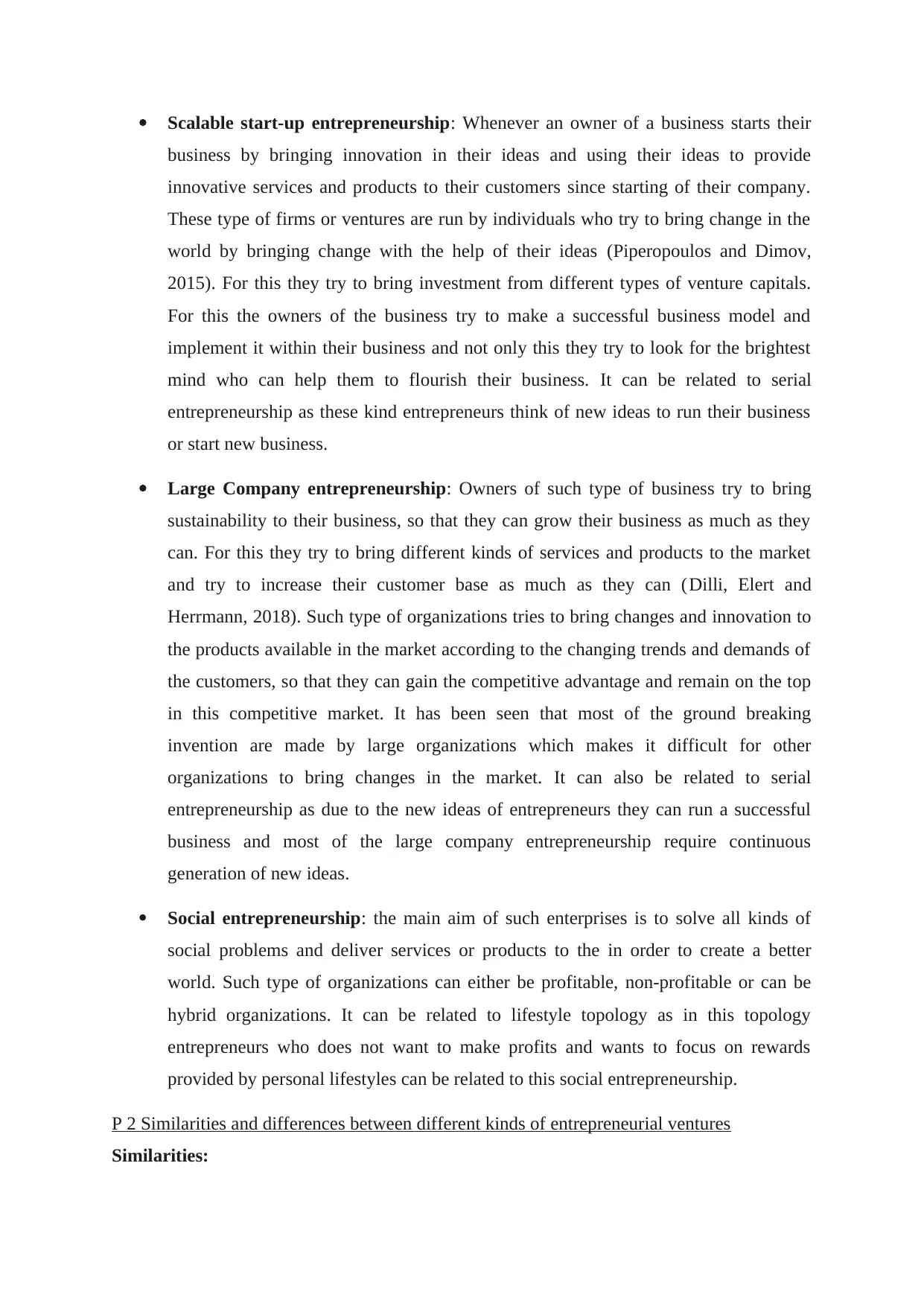
Scalable start-up entrepreneurship: Whenever an owner of a business starts their
business by bringing innovation in their ideas and using their ideas to provide
innovative services and products to their customers since starting of their company.
These type of firms or ventures are run by individuals who try to bring change in the
world by bringing change with the help of their ideas (Piperopoulos and Dimov,
2015). For this they try to bring investment from different types of venture capitals.
For this the owners of the business try to make a successful business model and
implement it within their business and not only this they try to look for the brightest
mind who can help them to flourish their business. It can be related to serial
entrepreneurship as these kind entrepreneurs think of new ideas to run their business
or start new business.
Large Company entrepreneurship: Owners of such type of business try to bring
sustainability to their business, so that they can grow their business as much as they
can. For this they try to bring different kinds of services and products to the market
and try to increase their customer base as much as they can (Dilli, Elert and
Herrmann, 2018). Such type of organizations tries to bring changes and innovation to
the products available in the market according to the changing trends and demands of
the customers, so that they can gain the competitive advantage and remain on the top
in this competitive market. It has been seen that most of the ground breaking
invention are made by large organizations which makes it difficult for other
organizations to bring changes in the market. It can also be related to serial
entrepreneurship as due to the new ideas of entrepreneurs they can run a successful
business and most of the large company entrepreneurship require continuous
generation of new ideas.
Social entrepreneurship: the main aim of such enterprises is to solve all kinds of
social problems and deliver services or products to the in order to create a better
world. Such type of organizations can either be profitable, non-profitable or can be
hybrid organizations. It can be related to lifestyle topology as in this topology
entrepreneurs who does not want to make profits and wants to focus on rewards
provided by personal lifestyles can be related to this social entrepreneurship.
P 2 Similarities and differences between different kinds of entrepreneurial ventures
Similarities:
business by bringing innovation in their ideas and using their ideas to provide
innovative services and products to their customers since starting of their company.
These type of firms or ventures are run by individuals who try to bring change in the
world by bringing change with the help of their ideas (Piperopoulos and Dimov,
2015). For this they try to bring investment from different types of venture capitals.
For this the owners of the business try to make a successful business model and
implement it within their business and not only this they try to look for the brightest
mind who can help them to flourish their business. It can be related to serial
entrepreneurship as these kind entrepreneurs think of new ideas to run their business
or start new business.
Large Company entrepreneurship: Owners of such type of business try to bring
sustainability to their business, so that they can grow their business as much as they
can. For this they try to bring different kinds of services and products to the market
and try to increase their customer base as much as they can (Dilli, Elert and
Herrmann, 2018). Such type of organizations tries to bring changes and innovation to
the products available in the market according to the changing trends and demands of
the customers, so that they can gain the competitive advantage and remain on the top
in this competitive market. It has been seen that most of the ground breaking
invention are made by large organizations which makes it difficult for other
organizations to bring changes in the market. It can also be related to serial
entrepreneurship as due to the new ideas of entrepreneurs they can run a successful
business and most of the large company entrepreneurship require continuous
generation of new ideas.
Social entrepreneurship: the main aim of such enterprises is to solve all kinds of
social problems and deliver services or products to the in order to create a better
world. Such type of organizations can either be profitable, non-profitable or can be
hybrid organizations. It can be related to lifestyle topology as in this topology
entrepreneurs who does not want to make profits and wants to focus on rewards
provided by personal lifestyles can be related to this social entrepreneurship.
P 2 Similarities and differences between different kinds of entrepreneurial ventures
Similarities:
Paraphrase This Document
Need a fresh take? Get an instant paraphrase of this document with our AI Paraphraser
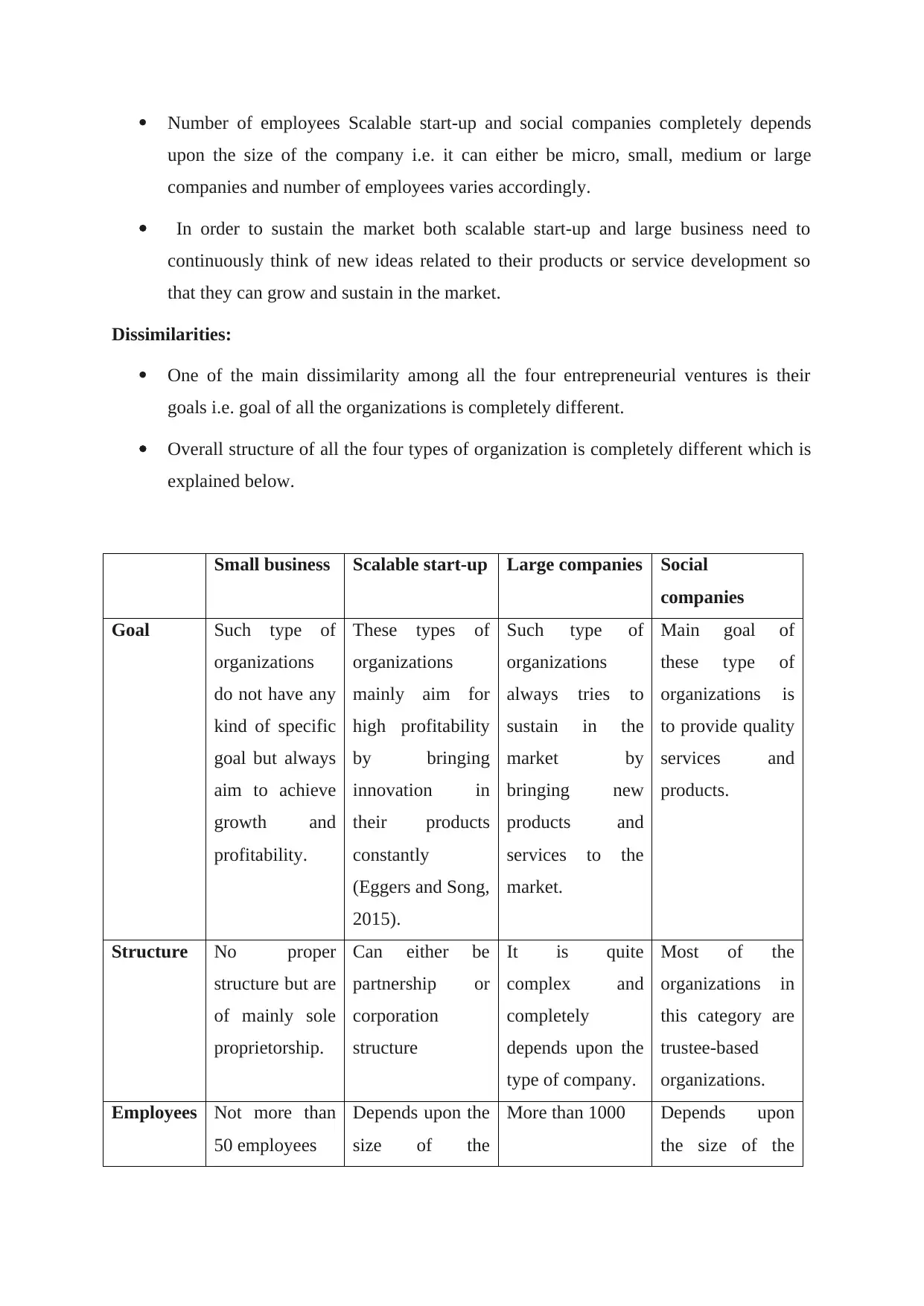
Number of employees Scalable start-up and social companies completely depends
upon the size of the company i.e. it can either be micro, small, medium or large
companies and number of employees varies accordingly.
In order to sustain the market both scalable start-up and large business need to
continuously think of new ideas related to their products or service development so
that they can grow and sustain in the market.
Dissimilarities:
One of the main dissimilarity among all the four entrepreneurial ventures is their
goals i.e. goal of all the organizations is completely different.
Overall structure of all the four types of organization is completely different which is
explained below.
Small business Scalable start-up Large companies Social
companies
Goal Such type of
organizations
do not have any
kind of specific
goal but always
aim to achieve
growth and
profitability.
These types of
organizations
mainly aim for
high profitability
by bringing
innovation in
their products
constantly
(Eggers and Song,
2015).
Such type of
organizations
always tries to
sustain in the
market by
bringing new
products and
services to the
market.
Main goal of
these type of
organizations is
to provide quality
services and
products.
Structure No proper
structure but are
of mainly sole
proprietorship.
Can either be
partnership or
corporation
structure
It is quite
complex and
completely
depends upon the
type of company.
Most of the
organizations in
this category are
trustee-based
organizations.
Employees Not more than
50 employees
Depends upon the
size of the
More than 1000 Depends upon
the size of the
upon the size of the company i.e. it can either be micro, small, medium or large
companies and number of employees varies accordingly.
In order to sustain the market both scalable start-up and large business need to
continuously think of new ideas related to their products or service development so
that they can grow and sustain in the market.
Dissimilarities:
One of the main dissimilarity among all the four entrepreneurial ventures is their
goals i.e. goal of all the organizations is completely different.
Overall structure of all the four types of organization is completely different which is
explained below.
Small business Scalable start-up Large companies Social
companies
Goal Such type of
organizations
do not have any
kind of specific
goal but always
aim to achieve
growth and
profitability.
These types of
organizations
mainly aim for
high profitability
by bringing
innovation in
their products
constantly
(Eggers and Song,
2015).
Such type of
organizations
always tries to
sustain in the
market by
bringing new
products and
services to the
market.
Main goal of
these type of
organizations is
to provide quality
services and
products.
Structure No proper
structure but are
of mainly sole
proprietorship.
Can either be
partnership or
corporation
structure
It is quite
complex and
completely
depends upon the
type of company.
Most of the
organizations in
this category are
trustee-based
organizations.
Employees Not more than
50 employees
Depends upon the
size of the
More than 1000 Depends upon
the size of the
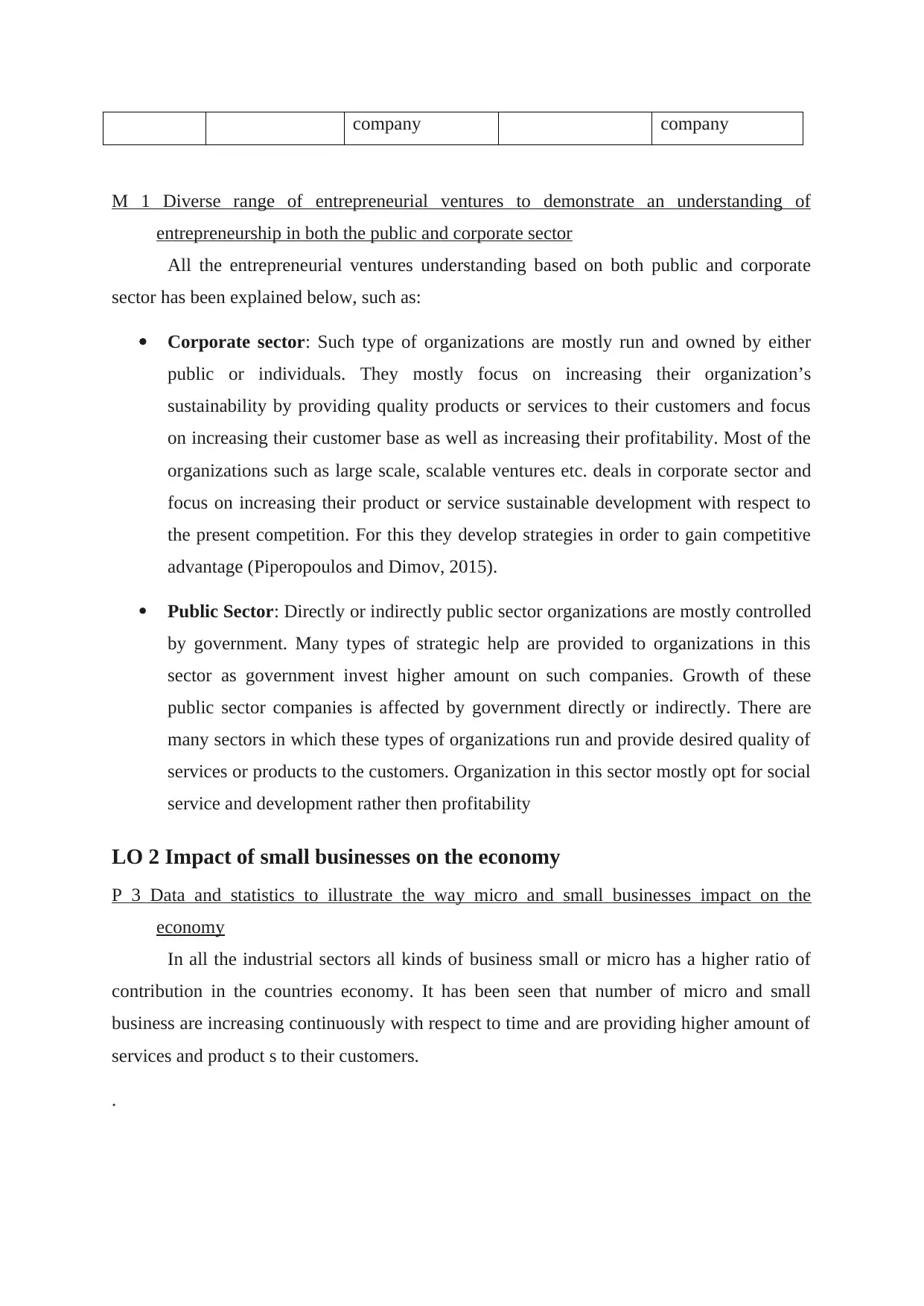
company company
M 1 Diverse range of entrepreneurial ventures to demonstrate an understanding of
entrepreneurship in both the public and corporate sector
All the entrepreneurial ventures understanding based on both public and corporate
sector has been explained below, such as:
Corporate sector: Such type of organizations are mostly run and owned by either
public or individuals. They mostly focus on increasing their organization’s
sustainability by providing quality products or services to their customers and focus
on increasing their customer base as well as increasing their profitability. Most of the
organizations such as large scale, scalable ventures etc. deals in corporate sector and
focus on increasing their product or service sustainable development with respect to
the present competition. For this they develop strategies in order to gain competitive
advantage (Piperopoulos and Dimov, 2015).
Public Sector: Directly or indirectly public sector organizations are mostly controlled
by government. Many types of strategic help are provided to organizations in this
sector as government invest higher amount on such companies. Growth of these
public sector companies is affected by government directly or indirectly. There are
many sectors in which these types of organizations run and provide desired quality of
services or products to the customers. Organization in this sector mostly opt for social
service and development rather then profitability
LO 2 Impact of small businesses on the economy
P 3 Data and statistics to illustrate the way micro and small businesses impact on the
economy
In all the industrial sectors all kinds of business small or micro has a higher ratio of
contribution in the countries economy. It has been seen that number of micro and small
business are increasing continuously with respect to time and are providing higher amount of
services and product s to their customers.
.
M 1 Diverse range of entrepreneurial ventures to demonstrate an understanding of
entrepreneurship in both the public and corporate sector
All the entrepreneurial ventures understanding based on both public and corporate
sector has been explained below, such as:
Corporate sector: Such type of organizations are mostly run and owned by either
public or individuals. They mostly focus on increasing their organization’s
sustainability by providing quality products or services to their customers and focus
on increasing their customer base as well as increasing their profitability. Most of the
organizations such as large scale, scalable ventures etc. deals in corporate sector and
focus on increasing their product or service sustainable development with respect to
the present competition. For this they develop strategies in order to gain competitive
advantage (Piperopoulos and Dimov, 2015).
Public Sector: Directly or indirectly public sector organizations are mostly controlled
by government. Many types of strategic help are provided to organizations in this
sector as government invest higher amount on such companies. Growth of these
public sector companies is affected by government directly or indirectly. There are
many sectors in which these types of organizations run and provide desired quality of
services or products to the customers. Organization in this sector mostly opt for social
service and development rather then profitability
LO 2 Impact of small businesses on the economy
P 3 Data and statistics to illustrate the way micro and small businesses impact on the
economy
In all the industrial sectors all kinds of business small or micro has a higher ratio of
contribution in the countries economy. It has been seen that number of micro and small
business are increasing continuously with respect to time and are providing higher amount of
services and product s to their customers.
.
⊘ This is a preview!⊘
Do you want full access?
Subscribe today to unlock all pages.

Trusted by 1+ million students worldwide
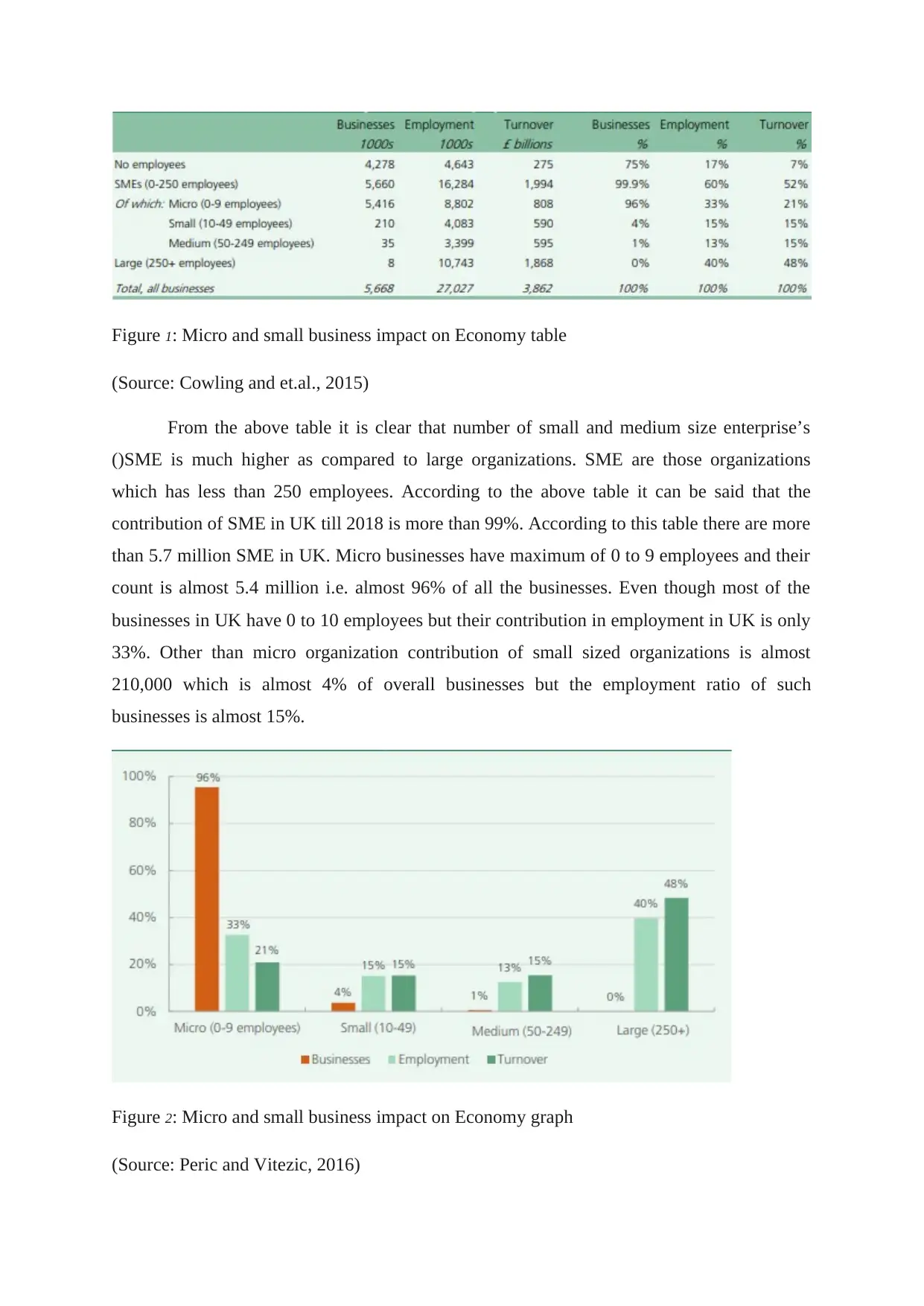
Figure 1: Micro and small business impact on Economy table
(Source: Cowling and et.al., 2015)
From the above table it is clear that number of small and medium size enterprise’s
()SME is much higher as compared to large organizations. SME are those organizations
which has less than 250 employees. According to the above table it can be said that the
contribution of SME in UK till 2018 is more than 99%. According to this table there are more
than 5.7 million SME in UK. Micro businesses have maximum of 0 to 9 employees and their
count is almost 5.4 million i.e. almost 96% of all the businesses. Even though most of the
businesses in UK have 0 to 10 employees but their contribution in employment in UK is only
33%. Other than micro organization contribution of small sized organizations is almost
210,000 which is almost 4% of overall businesses but the employment ratio of such
businesses is almost 15%.
Figure 2: Micro and small business impact on Economy graph
(Source: Peric and Vitezic, 2016)
(Source: Cowling and et.al., 2015)
From the above table it is clear that number of small and medium size enterprise’s
()SME is much higher as compared to large organizations. SME are those organizations
which has less than 250 employees. According to the above table it can be said that the
contribution of SME in UK till 2018 is more than 99%. According to this table there are more
than 5.7 million SME in UK. Micro businesses have maximum of 0 to 9 employees and their
count is almost 5.4 million i.e. almost 96% of all the businesses. Even though most of the
businesses in UK have 0 to 10 employees but their contribution in employment in UK is only
33%. Other than micro organization contribution of small sized organizations is almost
210,000 which is almost 4% of overall businesses but the employment ratio of such
businesses is almost 15%.
Figure 2: Micro and small business impact on Economy graph
(Source: Peric and Vitezic, 2016)
Paraphrase This Document
Need a fresh take? Get an instant paraphrase of this document with our AI Paraphraser
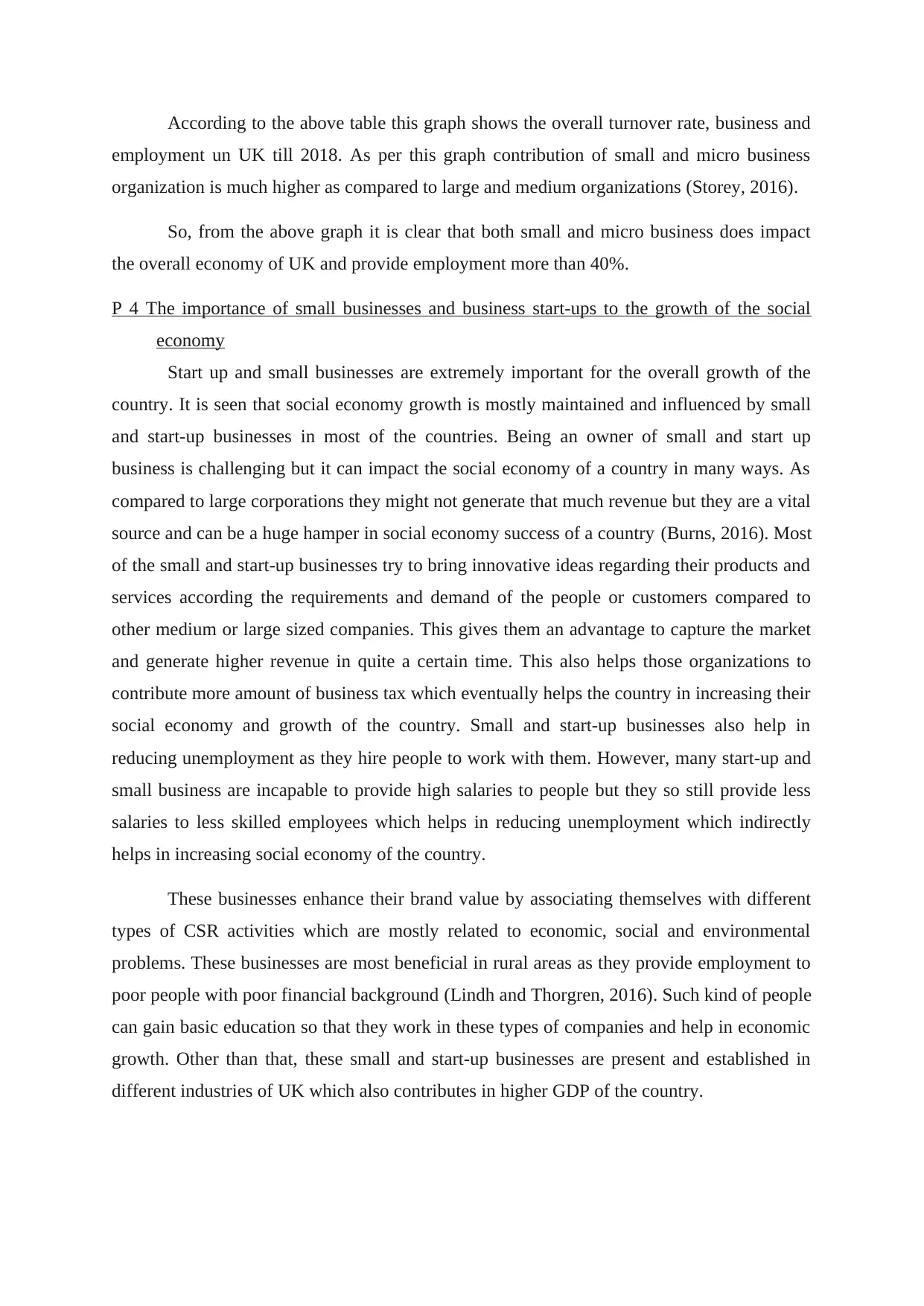
According to the above table this graph shows the overall turnover rate, business and
employment un UK till 2018. As per this graph contribution of small and micro business
organization is much higher as compared to large and medium organizations (Storey, 2016).
So, from the above graph it is clear that both small and micro business does impact
the overall economy of UK and provide employment more than 40%.
P 4 The importance of small businesses and business start-ups to the growth of the social
economy
Start up and small businesses are extremely important for the overall growth of the
country. It is seen that social economy growth is mostly maintained and influenced by small
and start-up businesses in most of the countries. Being an owner of small and start up
business is challenging but it can impact the social economy of a country in many ways. As
compared to large corporations they might not generate that much revenue but they are a vital
source and can be a huge hamper in social economy success of a country (Burns, 2016). Most
of the small and start-up businesses try to bring innovative ideas regarding their products and
services according the requirements and demand of the people or customers compared to
other medium or large sized companies. This gives them an advantage to capture the market
and generate higher revenue in quite a certain time. This also helps those organizations to
contribute more amount of business tax which eventually helps the country in increasing their
social economy and growth of the country. Small and start-up businesses also help in
reducing unemployment as they hire people to work with them. However, many start-up and
small business are incapable to provide high salaries to people but they so still provide less
salaries to less skilled employees which helps in reducing unemployment which indirectly
helps in increasing social economy of the country.
These businesses enhance their brand value by associating themselves with different
types of CSR activities which are mostly related to economic, social and environmental
problems. These businesses are most beneficial in rural areas as they provide employment to
poor people with poor financial background (Lindh and Thorgren, 2016). Such kind of people
can gain basic education so that they work in these types of companies and help in economic
growth. Other than that, these small and start-up businesses are present and established in
different industries of UK which also contributes in higher GDP of the country.
employment un UK till 2018. As per this graph contribution of small and micro business
organization is much higher as compared to large and medium organizations (Storey, 2016).
So, from the above graph it is clear that both small and micro business does impact
the overall economy of UK and provide employment more than 40%.
P 4 The importance of small businesses and business start-ups to the growth of the social
economy
Start up and small businesses are extremely important for the overall growth of the
country. It is seen that social economy growth is mostly maintained and influenced by small
and start-up businesses in most of the countries. Being an owner of small and start up
business is challenging but it can impact the social economy of a country in many ways. As
compared to large corporations they might not generate that much revenue but they are a vital
source and can be a huge hamper in social economy success of a country (Burns, 2016). Most
of the small and start-up businesses try to bring innovative ideas regarding their products and
services according the requirements and demand of the people or customers compared to
other medium or large sized companies. This gives them an advantage to capture the market
and generate higher revenue in quite a certain time. This also helps those organizations to
contribute more amount of business tax which eventually helps the country in increasing their
social economy and growth of the country. Small and start-up businesses also help in
reducing unemployment as they hire people to work with them. However, many start-up and
small business are incapable to provide high salaries to people but they so still provide less
salaries to less skilled employees which helps in reducing unemployment which indirectly
helps in increasing social economy of the country.
These businesses enhance their brand value by associating themselves with different
types of CSR activities which are mostly related to economic, social and environmental
problems. These businesses are most beneficial in rural areas as they provide employment to
poor people with poor financial background (Lindh and Thorgren, 2016). Such kind of people
can gain basic education so that they work in these types of companies and help in economic
growth. Other than that, these small and start-up businesses are present and established in
different industries of UK which also contributes in higher GDP of the country.
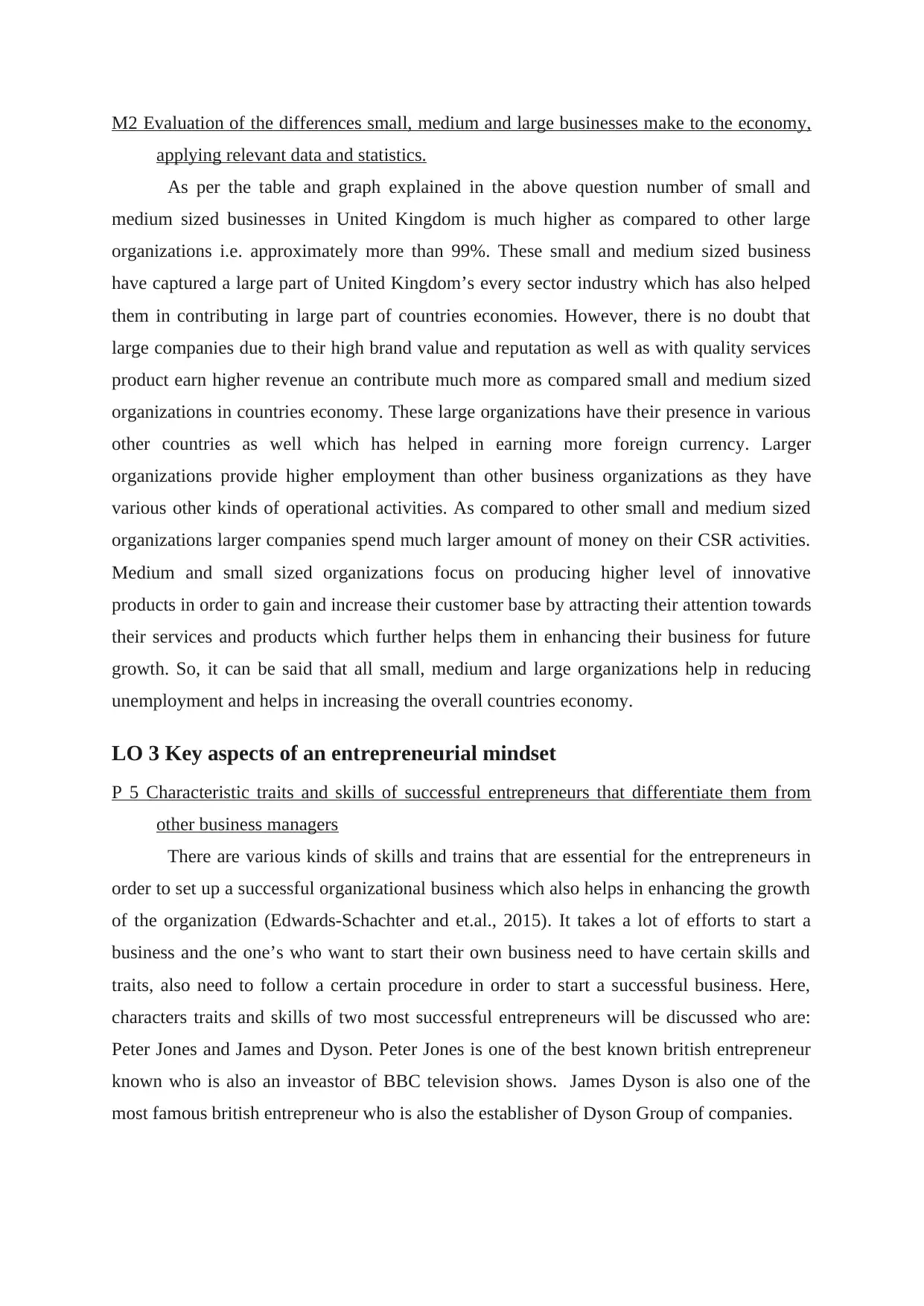
M2 Evaluation of the differences small, medium and large businesses make to the economy,
applying relevant data and statistics.
As per the table and graph explained in the above question number of small and
medium sized businesses in United Kingdom is much higher as compared to other large
organizations i.e. approximately more than 99%. These small and medium sized business
have captured a large part of United Kingdom’s every sector industry which has also helped
them in contributing in large part of countries economies. However, there is no doubt that
large companies due to their high brand value and reputation as well as with quality services
product earn higher revenue an contribute much more as compared small and medium sized
organizations in countries economy. These large organizations have their presence in various
other countries as well which has helped in earning more foreign currency. Larger
organizations provide higher employment than other business organizations as they have
various other kinds of operational activities. As compared to other small and medium sized
organizations larger companies spend much larger amount of money on their CSR activities.
Medium and small sized organizations focus on producing higher level of innovative
products in order to gain and increase their customer base by attracting their attention towards
their services and products which further helps them in enhancing their business for future
growth. So, it can be said that all small, medium and large organizations help in reducing
unemployment and helps in increasing the overall countries economy.
LO 3 Key aspects of an entrepreneurial mindset
P 5 Characteristic traits and skills of successful entrepreneurs that differentiate them from
other business managers
There are various kinds of skills and trains that are essential for the entrepreneurs in
order to set up a successful organizational business which also helps in enhancing the growth
of the organization (Edwards-Schachter and et.al., 2015). It takes a lot of efforts to start a
business and the one’s who want to start their own business need to have certain skills and
traits, also need to follow a certain procedure in order to start a successful business. Here,
characters traits and skills of two most successful entrepreneurs will be discussed who are:
Peter Jones and James and Dyson. Peter Jones is one of the best known british entrepreneur
known who is also an inveastor of BBC television shows. James Dyson is also one of the
most famous british entrepreneur who is also the establisher of Dyson Group of companies.
applying relevant data and statistics.
As per the table and graph explained in the above question number of small and
medium sized businesses in United Kingdom is much higher as compared to other large
organizations i.e. approximately more than 99%. These small and medium sized business
have captured a large part of United Kingdom’s every sector industry which has also helped
them in contributing in large part of countries economies. However, there is no doubt that
large companies due to their high brand value and reputation as well as with quality services
product earn higher revenue an contribute much more as compared small and medium sized
organizations in countries economy. These large organizations have their presence in various
other countries as well which has helped in earning more foreign currency. Larger
organizations provide higher employment than other business organizations as they have
various other kinds of operational activities. As compared to other small and medium sized
organizations larger companies spend much larger amount of money on their CSR activities.
Medium and small sized organizations focus on producing higher level of innovative
products in order to gain and increase their customer base by attracting their attention towards
their services and products which further helps them in enhancing their business for future
growth. So, it can be said that all small, medium and large organizations help in reducing
unemployment and helps in increasing the overall countries economy.
LO 3 Key aspects of an entrepreneurial mindset
P 5 Characteristic traits and skills of successful entrepreneurs that differentiate them from
other business managers
There are various kinds of skills and trains that are essential for the entrepreneurs in
order to set up a successful organizational business which also helps in enhancing the growth
of the organization (Edwards-Schachter and et.al., 2015). It takes a lot of efforts to start a
business and the one’s who want to start their own business need to have certain skills and
traits, also need to follow a certain procedure in order to start a successful business. Here,
characters traits and skills of two most successful entrepreneurs will be discussed who are:
Peter Jones and James and Dyson. Peter Jones is one of the best known british entrepreneur
known who is also an inveastor of BBC television shows. James Dyson is also one of the
most famous british entrepreneur who is also the establisher of Dyson Group of companies.
⊘ This is a preview!⊘
Do you want full access?
Subscribe today to unlock all pages.

Trusted by 1+ million students worldwide
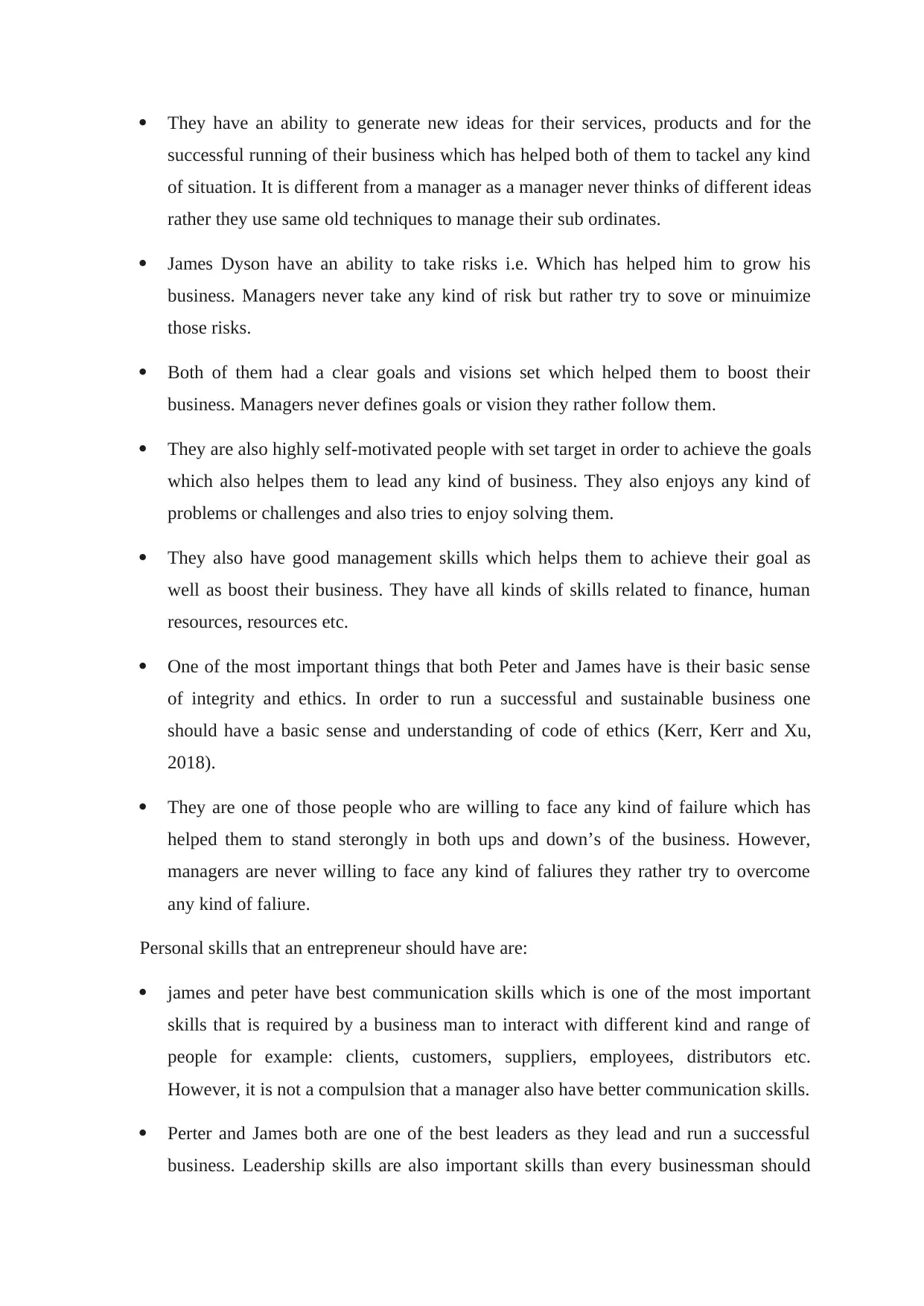
They have an ability to generate new ideas for their services, products and for the
successful running of their business which has helped both of them to tackel any kind
of situation. It is different from a manager as a manager never thinks of different ideas
rather they use same old techniques to manage their sub ordinates.
James Dyson have an ability to take risks i.e. Which has helped him to grow his
business. Managers never take any kind of risk but rather try to sove or minuimize
those risks.
Both of them had a clear goals and visions set which helped them to boost their
business. Managers never defines goals or vision they rather follow them.
They are also highly self-motivated people with set target in order to achieve the goals
which also helpes them to lead any kind of business. They also enjoys any kind of
problems or challenges and also tries to enjoy solving them.
They also have good management skills which helps them to achieve their goal as
well as boost their business. They have all kinds of skills related to finance, human
resources, resources etc.
One of the most important things that both Peter and James have is their basic sense
of integrity and ethics. In order to run a successful and sustainable business one
should have a basic sense and understanding of code of ethics (Kerr, Kerr and Xu,
2018).
They are one of those people who are willing to face any kind of failure which has
helped them to stand sterongly in both ups and down’s of the business. However,
managers are never willing to face any kind of faliures they rather try to overcome
any kind of faliure.
Personal skills that an entrepreneur should have are:
james and peter have best communication skills which is one of the most important
skills that is required by a business man to interact with different kind and range of
people for example: clients, customers, suppliers, employees, distributors etc.
However, it is not a compulsion that a manager also have better communication skills.
Perter and James both are one of the best leaders as they lead and run a successful
business. Leadership skills are also important skills than every businessman should
successful running of their business which has helped both of them to tackel any kind
of situation. It is different from a manager as a manager never thinks of different ideas
rather they use same old techniques to manage their sub ordinates.
James Dyson have an ability to take risks i.e. Which has helped him to grow his
business. Managers never take any kind of risk but rather try to sove or minuimize
those risks.
Both of them had a clear goals and visions set which helped them to boost their
business. Managers never defines goals or vision they rather follow them.
They are also highly self-motivated people with set target in order to achieve the goals
which also helpes them to lead any kind of business. They also enjoys any kind of
problems or challenges and also tries to enjoy solving them.
They also have good management skills which helps them to achieve their goal as
well as boost their business. They have all kinds of skills related to finance, human
resources, resources etc.
One of the most important things that both Peter and James have is their basic sense
of integrity and ethics. In order to run a successful and sustainable business one
should have a basic sense and understanding of code of ethics (Kerr, Kerr and Xu,
2018).
They are one of those people who are willing to face any kind of failure which has
helped them to stand sterongly in both ups and down’s of the business. However,
managers are never willing to face any kind of faliures they rather try to overcome
any kind of faliure.
Personal skills that an entrepreneur should have are:
james and peter have best communication skills which is one of the most important
skills that is required by a business man to interact with different kind and range of
people for example: clients, customers, suppliers, employees, distributors etc.
However, it is not a compulsion that a manager also have better communication skills.
Perter and James both are one of the best leaders as they lead and run a successful
business. Leadership skills are also important skills than every businessman should
Paraphrase This Document
Need a fresh take? Get an instant paraphrase of this document with our AI Paraphraser
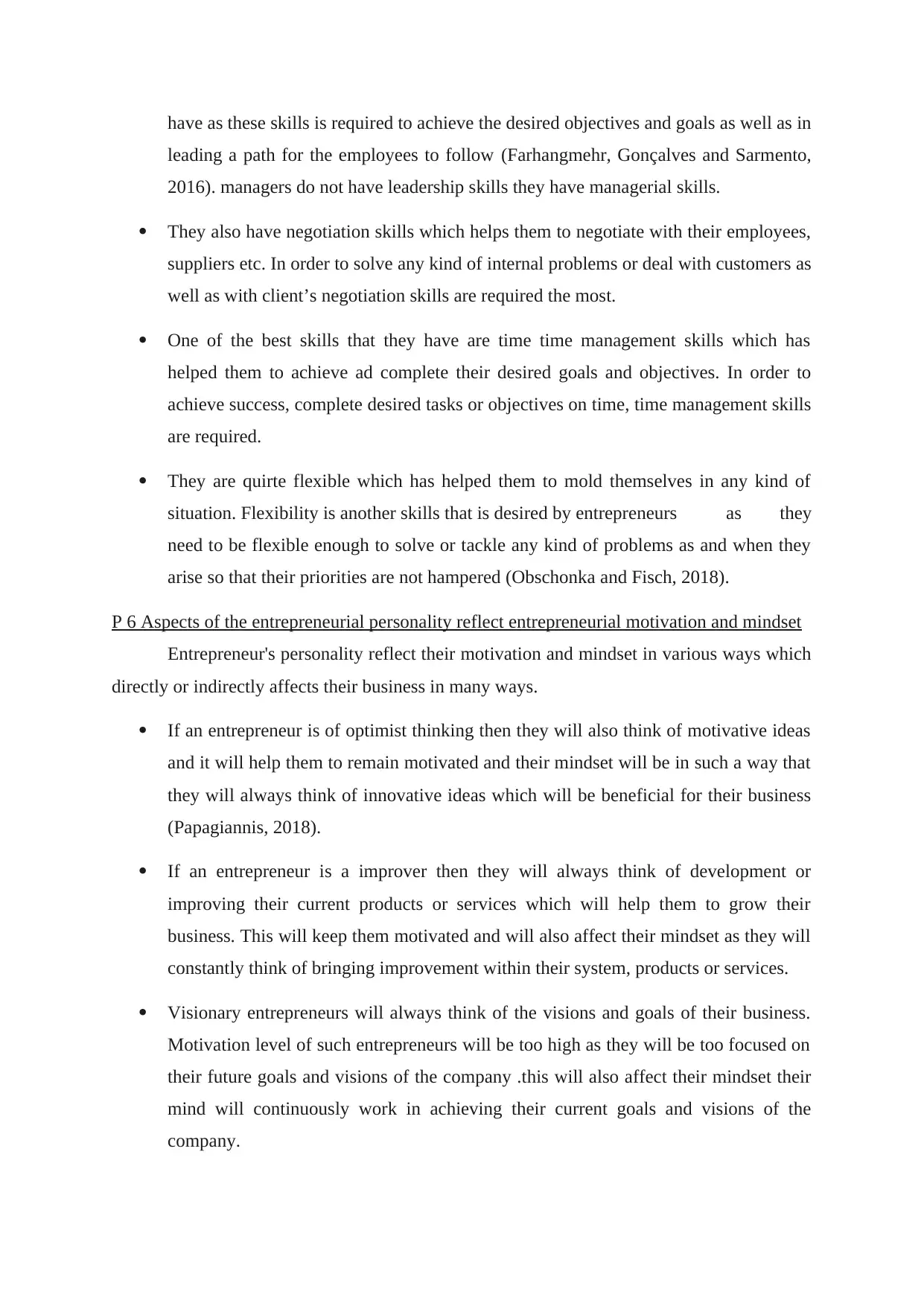
have as these skills is required to achieve the desired objectives and goals as well as in
leading a path for the employees to follow (Farhangmehr, Gonçalves and Sarmento,
2016). managers do not have leadership skills they have managerial skills.
They also have negotiation skills which helps them to negotiate with their employees,
suppliers etc. In order to solve any kind of internal problems or deal with customers as
well as with client’s negotiation skills are required the most.
One of the best skills that they have are time time management skills which has
helped them to achieve ad complete their desired goals and objectives. In order to
achieve success, complete desired tasks or objectives on time, time management skills
are required.
They are quirte flexible which has helped them to mold themselves in any kind of
situation. Flexibility is another skills that is desired by entrepreneurs as they
need to be flexible enough to solve or tackle any kind of problems as and when they
arise so that their priorities are not hampered (Obschonka and Fisch, 2018).
P 6 Aspects of the entrepreneurial personality reflect entrepreneurial motivation and mindset
Entrepreneur's personality reflect their motivation and mindset in various ways which
directly or indirectly affects their business in many ways.
If an entrepreneur is of optimist thinking then they will also think of motivative ideas
and it will help them to remain motivated and their mindset will be in such a way that
they will always think of innovative ideas which will be beneficial for their business
(Papagiannis, 2018).
If an entrepreneur is a improver then they will always think of development or
improving their current products or services which will help them to grow their
business. This will keep them motivated and will also affect their mindset as they will
constantly think of bringing improvement within their system, products or services.
Visionary entrepreneurs will always think of the visions and goals of their business.
Motivation level of such entrepreneurs will be too high as they will be too focused on
their future goals and visions of the company .this will also affect their mindset their
mind will continuously work in achieving their current goals and visions of the
company.
leading a path for the employees to follow (Farhangmehr, Gonçalves and Sarmento,
2016). managers do not have leadership skills they have managerial skills.
They also have negotiation skills which helps them to negotiate with their employees,
suppliers etc. In order to solve any kind of internal problems or deal with customers as
well as with client’s negotiation skills are required the most.
One of the best skills that they have are time time management skills which has
helped them to achieve ad complete their desired goals and objectives. In order to
achieve success, complete desired tasks or objectives on time, time management skills
are required.
They are quirte flexible which has helped them to mold themselves in any kind of
situation. Flexibility is another skills that is desired by entrepreneurs as they
need to be flexible enough to solve or tackle any kind of problems as and when they
arise so that their priorities are not hampered (Obschonka and Fisch, 2018).
P 6 Aspects of the entrepreneurial personality reflect entrepreneurial motivation and mindset
Entrepreneur's personality reflect their motivation and mindset in various ways which
directly or indirectly affects their business in many ways.
If an entrepreneur is of optimist thinking then they will also think of motivative ideas
and it will help them to remain motivated and their mindset will be in such a way that
they will always think of innovative ideas which will be beneficial for their business
(Papagiannis, 2018).
If an entrepreneur is a improver then they will always think of development or
improving their current products or services which will help them to grow their
business. This will keep them motivated and will also affect their mindset as they will
constantly think of bringing improvement within their system, products or services.
Visionary entrepreneurs will always think of the visions and goals of their business.
Motivation level of such entrepreneurs will be too high as they will be too focused on
their future goals and visions of the company .this will also affect their mindset their
mind will continuously work in achieving their current goals and visions of the
company.
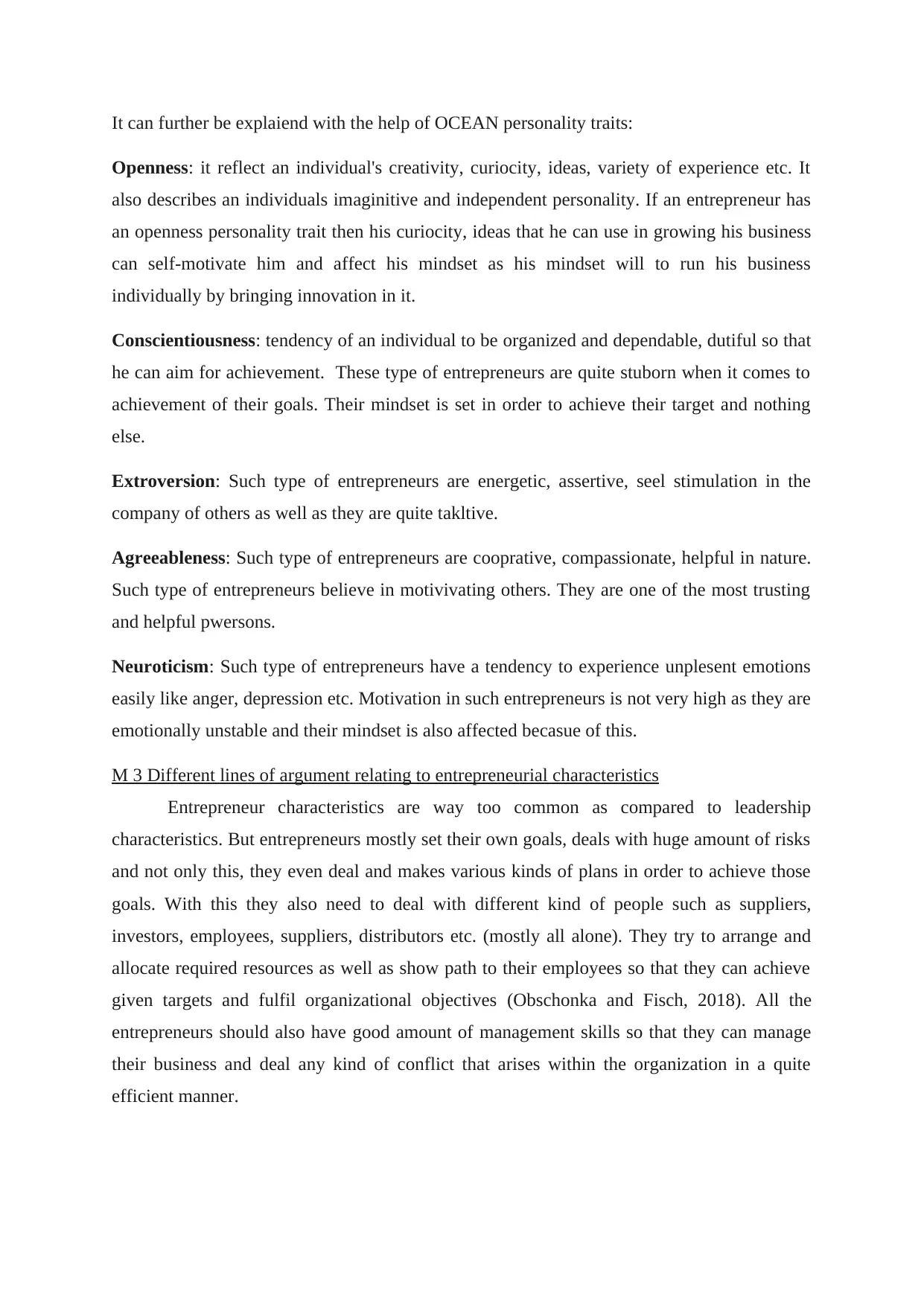
It can further be explaiend with the help of OCEAN personality traits:
Openness: it reflect an individual's creativity, curiocity, ideas, variety of experience etc. It
also describes an individuals imaginitive and independent personality. If an entrepreneur has
an openness personality trait then his curiocity, ideas that he can use in growing his business
can self-motivate him and affect his mindset as his mindset will to run his business
individually by bringing innovation in it.
Conscientiousness: tendency of an individual to be organized and dependable, dutiful so that
he can aim for achievement. These type of entrepreneurs are quite stuborn when it comes to
achievement of their goals. Their mindset is set in order to achieve their target and nothing
else.
Extroversion: Such type of entrepreneurs are energetic, assertive, seel stimulation in the
company of others as well as they are quite takltive.
Agreeableness: Such type of entrepreneurs are cooprative, compassionate, helpful in nature.
Such type of entrepreneurs believe in motivivating others. They are one of the most trusting
and helpful pwersons.
Neuroticism: Such type of entrepreneurs have a tendency to experience unplesent emotions
easily like anger, depression etc. Motivation in such entrepreneurs is not very high as they are
emotionally unstable and their mindset is also affected becasue of this.
M 3 Different lines of argument relating to entrepreneurial characteristics
Entrepreneur characteristics are way too common as compared to leadership
characteristics. But entrepreneurs mostly set their own goals, deals with huge amount of risks
and not only this, they even deal and makes various kinds of plans in order to achieve those
goals. With this they also need to deal with different kind of people such as suppliers,
investors, employees, suppliers, distributors etc. (mostly all alone). They try to arrange and
allocate required resources as well as show path to their employees so that they can achieve
given targets and fulfil organizational objectives (Obschonka and Fisch, 2018). All the
entrepreneurs should also have good amount of management skills so that they can manage
their business and deal any kind of conflict that arises within the organization in a quite
efficient manner.
Openness: it reflect an individual's creativity, curiocity, ideas, variety of experience etc. It
also describes an individuals imaginitive and independent personality. If an entrepreneur has
an openness personality trait then his curiocity, ideas that he can use in growing his business
can self-motivate him and affect his mindset as his mindset will to run his business
individually by bringing innovation in it.
Conscientiousness: tendency of an individual to be organized and dependable, dutiful so that
he can aim for achievement. These type of entrepreneurs are quite stuborn when it comes to
achievement of their goals. Their mindset is set in order to achieve their target and nothing
else.
Extroversion: Such type of entrepreneurs are energetic, assertive, seel stimulation in the
company of others as well as they are quite takltive.
Agreeableness: Such type of entrepreneurs are cooprative, compassionate, helpful in nature.
Such type of entrepreneurs believe in motivivating others. They are one of the most trusting
and helpful pwersons.
Neuroticism: Such type of entrepreneurs have a tendency to experience unplesent emotions
easily like anger, depression etc. Motivation in such entrepreneurs is not very high as they are
emotionally unstable and their mindset is also affected becasue of this.
M 3 Different lines of argument relating to entrepreneurial characteristics
Entrepreneur characteristics are way too common as compared to leadership
characteristics. But entrepreneurs mostly set their own goals, deals with huge amount of risks
and not only this, they even deal and makes various kinds of plans in order to achieve those
goals. With this they also need to deal with different kind of people such as suppliers,
investors, employees, suppliers, distributors etc. (mostly all alone). They try to arrange and
allocate required resources as well as show path to their employees so that they can achieve
given targets and fulfil organizational objectives (Obschonka and Fisch, 2018). All the
entrepreneurs should also have good amount of management skills so that they can manage
their business and deal any kind of conflict that arises within the organization in a quite
efficient manner.
⊘ This is a preview!⊘
Do you want full access?
Subscribe today to unlock all pages.

Trusted by 1+ million students worldwide
1 out of 16
Related Documents
Your All-in-One AI-Powered Toolkit for Academic Success.
+13062052269
info@desklib.com
Available 24*7 on WhatsApp / Email
![[object Object]](/_next/static/media/star-bottom.7253800d.svg)
Unlock your academic potential
Copyright © 2020–2026 A2Z Services. All Rights Reserved. Developed and managed by ZUCOL.





